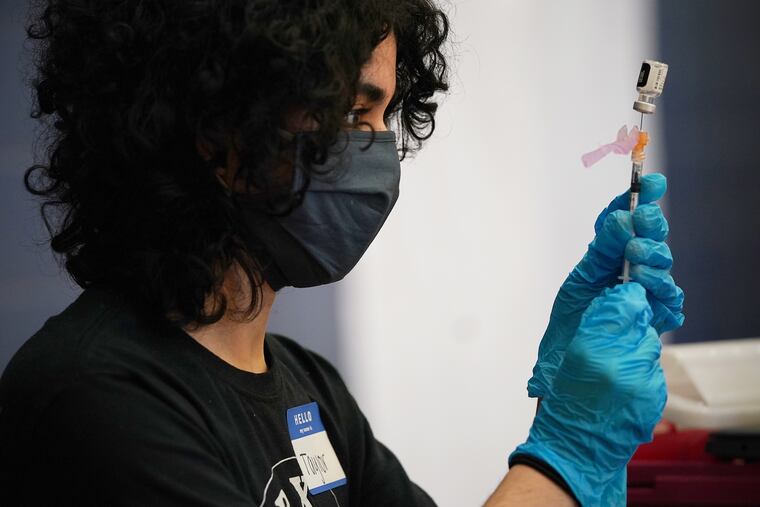Health officials scramble with late logistics to get younger kids vaccinated against COVID-19
Shipment sizes and storage questions have only recently been answered for vaccine providers.

Federal approval of Pfizer’s COVID-19 vaccine for children is expected by early November, but city and state officials say details of how doses will be shipped and stored have only recently been clarified.
As recently as last week, public health officials and physicians were not sure how large the vaccine deliveries for children ages 5 to 11 would be, a mundane logistical question that has big consequences for pediatrics offices deciding whether they have the capacity to carry doses.
“This is a great example of how difficult this response is to plan for,” said James Garrow, a spokesperson for the Philadelphia Department of Public Health.
Officials in New Jersey and Pennsylvania are still working to get more pediatricians’ offices registered to carry COVID-19 vaccine doses. In Philadelphia, about 70% of the pediatricians who participate in the federal Vaccines for Children program, which provides doctors’ offices with free doses of vaccine for children who are uninsured or underinsured, are registered to provide COVID-19 vaccines. The city would like to be closer to 80% by the time doses are available.
As recently as late September, an estimated 25% of the New Jersey’s doctors offices participating in the federal program were registered to administer the COVID-19 vaccine. That number has grown considerably, the New Jersey Department of Health reported, to 58% of the state’s 895 offices participating in the Vaccines for Children program.
» READ MORE: Pfizer says its COVID-19 vaccines are 91% effective in kids 5-11. Here’s what else you need to know.
About 69% of the 1,290 pediatric providers participating in Vaccines for Children in Pennsylvania are registered to carry COVID-19 vaccine doses, up from 62% about a month ago.
Nationally, about 25,000 pediatricians’ offices have registered to administer COVID-19 doses, the White House reported Wednesday.
“We would like to see as many pediatric sites and practices sign up to give vaccine as possible,” said Kate Tigue, a Lackawanna County pediatrician who serves as secretary and treasurer of the Pennsylvania chapter of the American Academy of Pediatrics.
Efforts to enroll more offices have been aggressive, she said, and she anticipated new information about how the doses would be delivered and stored would encourage more to participate.
Pennsylvania health officials, though, noted children would be able to receive vaccine at all sites already administering shots to people ages 12 to adult, including pharmacies and vaccination clinics.
“We anticipate working with the same group of providers, including pediatricians, primary care physicians, family doctors, pharmacies, large retailers, special clinics,” said Mark O’Neill, a spokesperson for the state Health Department, “to make it as easy as possible for children aged 5 to 11 to get the vaccine.”
The state issued a recommendation in August that vaccine providers team with school districts to host clinics in schools, and the White House said in comments last week that vaccinations in schools are a significant part of its strategy to get doses to younger children.
So far, federal authorities have formally considered only the Pfizer-BioNTech vaccine for children. The Moderna and Johnson & Johnson vaccines are still in trials to determine their effectiveness and safety in children.
The Food and Drug Administration said Friday that Pfizer’s doses for children were highly effective at preventing symptomatic COVID-19 cases and found no evidence they led to unexpected safety concerns. The agency affirmed Pfizer’s finding that the doses are better than 90% effective in preventing symptomatic illness in children ages 5 to 11. The doses are delivered with a smaller needle and are a third the volume of the doses adults receive. About 28 million children in the United States will be eligible to receive the doses once they receive federal approval.
The doses were found to cause similar or less severe side effects in young children as those experienced by teens.
A Food and Drug Administration panel is scheduled to review the Pfizer vaccine’s data Oct. 26, and the CDC should make a recommendation on their use by the beginning of November.
Early in the vaccine rollout, it appeared the Pfizer-BioNTech vaccine needed to be stored at extremely low temperatures, which required specialized freezer units many doctors’ offices didn’t have. However, doctors have learned the Pfizer vaccine remains viable for 10 weeks in standard refrigeration.
» READ MORE: The White House details plans to vaccinate 28 million children ages 5-11
Doctors also were concerned about the size of deliveries. Pfizer doses have shipped in batches of 1,170 doses, too large for some offices to manage. The CDC confirmed just a week ago that the first orders of children’s doses would be shipped in batches of just 300 doses, health officials said. Subsequent deliveries could be as small as 100 doses. The Pfizer vaccine comes in vials that each hold about 10 doses.
That will save the city health department a lot of work, Garrow said. Before it received confirmation of the smaller batch size, the department was prepared to break down large deliveries into smaller packages before shipping them to doctors’ offices.
“A week before we were due to receive pediatric doses, and after we were able to place orders,” Garrow said, “we find out that the package size is changing and we can take the whole process of breaking down and smaller deliveries out of our planned process.”
Pennsylvania pediatricians began putting in orders for COVID-19 vaccine doses Wednesday and expected to be told what their allotment would be by Friday, Tigue said. She expected shipments to begin arriving Nov. 1 and 2, in time for the anticipated federal approval.